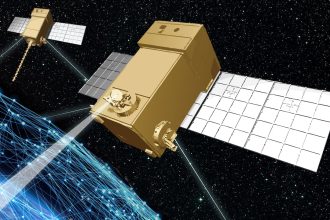Navy researchers are testing a fully autonomous satellite designed to detect and characterize objects in space.
The system, called Autosat, is designed to task, calibrate its signals and send and receive information on its own without the need for a human operator. Steven Meier, director of space technology at the Naval Research Laboratory, said Thursday his team has demonstrated the capability in the lab.
“We’ve done a demo of this and proven out the principles and are looking for the next step,” he said during a panel at the Potomac Officers Club’s Research and Development Summit in McLean, Virginia. “We want to get funding to actually build a system along these lines and launch it.”
Autosat features an imaging payload that the lab has trained with a database of images, including airports, runways, roads and buildings. The more information the payload receives, the smarter it becomes about recognizing patterns and spotting objects.
Satellites that can detect and track objects and send intelligence to military users are in high demand from defense agencies like the Space Force and U.S. Space Command. But Meier said the true potential of Autosat is in its autonomy, allowing it to navigate without GPS, communications and ground control.
Ultimately, Meier said, the lab envisions a network of Autosat-like systems.
Space Force interest
The Space Force is also exploring artificial intelligence and autonomy for a number of applications — from reducing the burden on operators to giving decision-makers a better understanding of threats in space on faster timelines.
Speaking in August at a National Defense Industrial Association event, the Space Force’s former top acquisition official Frank Calvelli said he expects satellites to be “significantly more autonomous” within the next 10 to 15 years. Future spacecraft, he said, will be less reliant on the antennas and ground stations that are typically early — and easy — targets of cyber attacks during a conflict.
Last November, the service awarded a contract to Colorado-based Advanced Space to conduct a feasibility study on using AI and machine learning algorithms to guide satellites and help them maneuver around space threats.
The Space Development Agency, which is building a constellation of hundreds of small satellites, views automation as fundamental to its future space architecture.
The Space Rapid Capabilities Office is working with a slew of commercial firms to incorporate AI into a more modern ground system called Rapid Resilient Command and Control. Kelly Hammett, the organization’s director, told reporters in December one of the system’s key capabilities is automated mission planning, which will allow operators to schedule contacts and maneuvers.
“You can run a variety of cases and situations, decide the one you want and then press the button and it’ll upload a mission profile,” he said at the Space Force Association’s Spacepower Conference in Orlando, Florida.
Courtney Albon is C4ISRNET’s space and emerging technology reporter. She has covered the U.S. military since 2012, with a focus on the Air Force and Space Force. She has reported on some of the Defense Department’s most significant acquisition, budget and policy challenges.
Read the full article here








